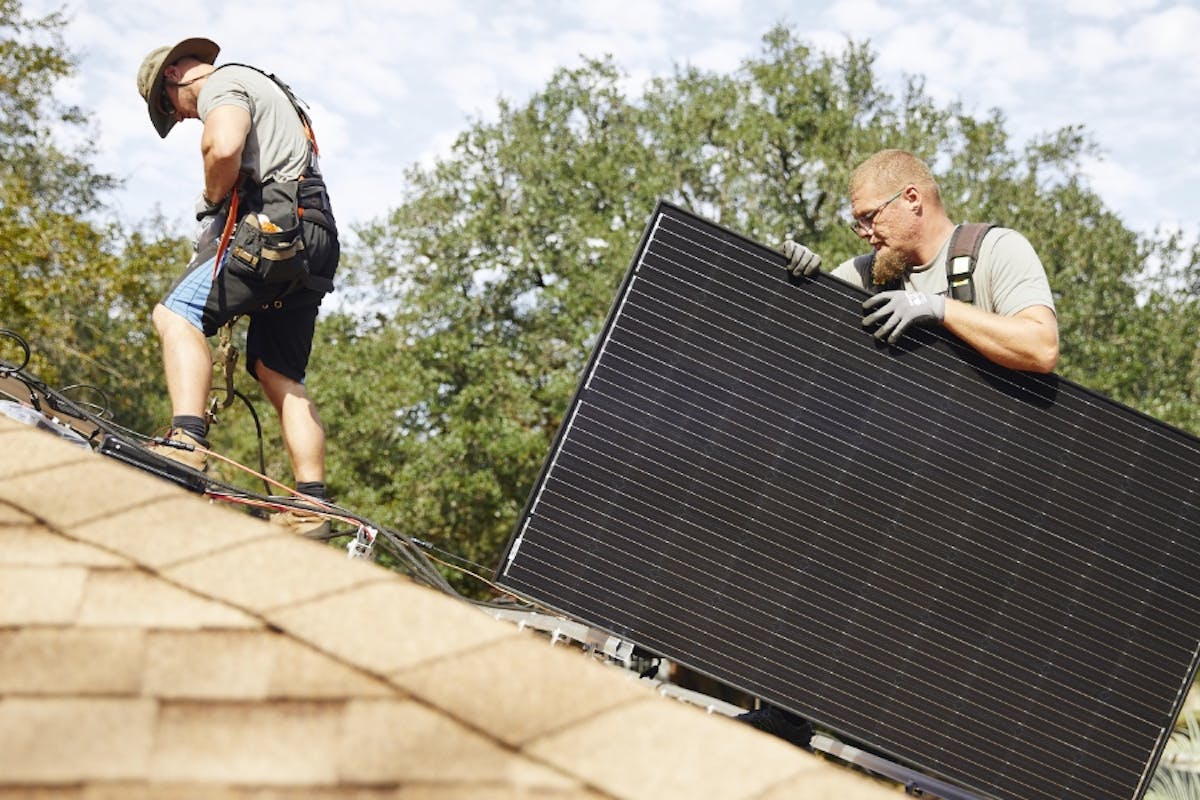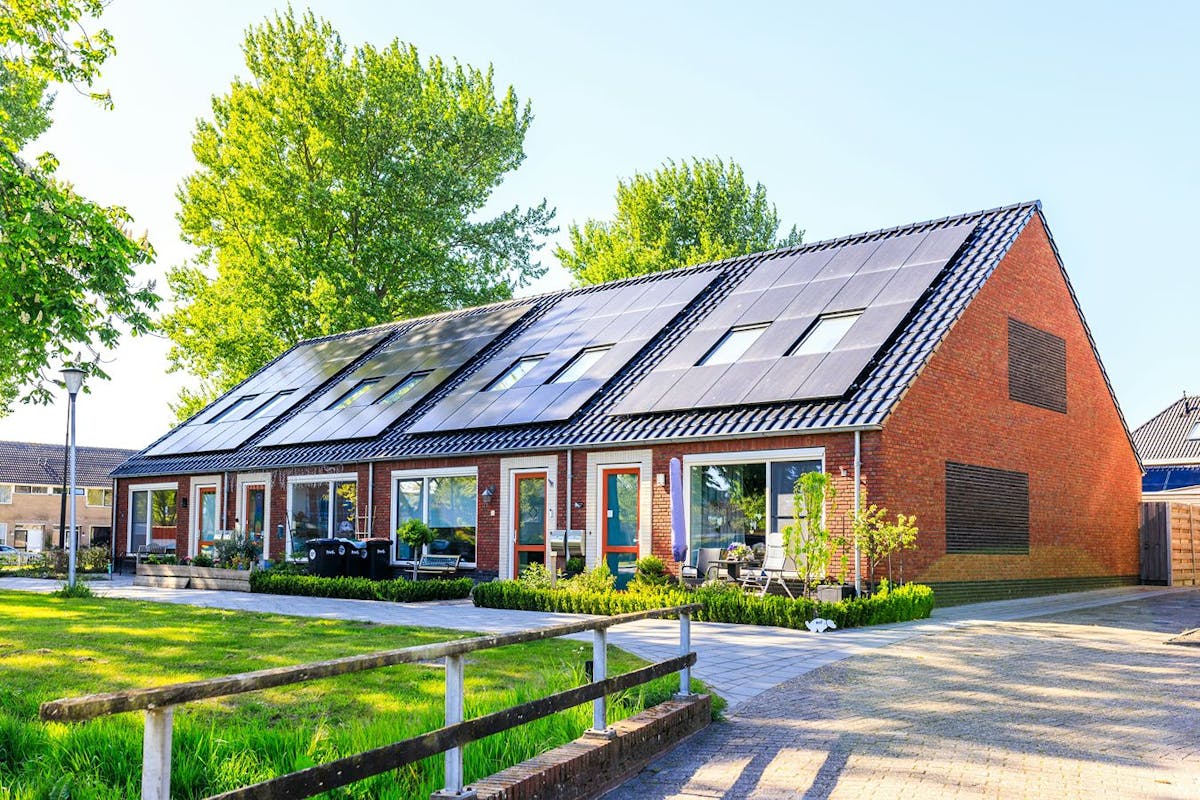Solar Panel Installation Process: Step-by-Step
Last edited
Author
Andrew Blok
Electrification and Solar Writer and Editor
Editor
Andrew Giermak
Solar and Electrification Writer and Editor

Installing solar panels on your roof only takes a day or two. But the time between your first contact with a solar company and your solar panels supplying your home can be weeks or months (at least here in the United States).
Solar panels can last for 25 years or longer, waiting through the design, permitting, installation, and activation can definitely be worth it. A knowledgeable solar advisor will walk you through each step, so while the process can take a while, it’s not often difficult.
Here's how the solar panel installation process works.
See how much you can save by going solar with Palmetto
Contract and design
Let’s get started! This combined stage is rather straightforward, and it focuses primarily on reviewing, signing, and approving a range of documents, some of which can be handled online.
1. Introductory meetings: Speak with a sales representative to review your options for going solar, including any incentives that can reduce the cost of solar panels, and whether purchasing or leasing solar panels is the best fit for you. Discuss your questions, comments, and concerns, and look at whether it makes sense for your home.
2. Site survey: For most homes, the site survey can be completed virtually. In addition to satellite imagery, you may need to provide additional information or photographs before your system design can be finalized.
3. Contract review and signing: Your contract outlines the design, pricing, and financing information (if applicable), as well as storage options, any necessary site improvements, and additional coverage, like through Palmetto Protect. For most homeowners, it takes about one hour to review and sign all required documents.
4. Document review: Once you sign your contract, the solar company will carefully review all documents.
5. Engineering design: A design and engineering team will review the information submitted, as well as mapping data on your roof, and solar regulations in your area, to configure the best solar energy system for maximum performance and long-term savings. In a small percentage of situations, this could include an in-person site audit.
In some cases this can turn up additional work that needs completing, like roof repair or an electrical panel upgrade.
Permitting & approvals
A solar company will navigate the permitting and approvals process for you. That includes coordination with your utility, any incentive programs, and your “authority having jurisdiction” (your local permitting authority).
If you have an HOA, you will need to take an active role in communicating with them.
The permitting process takes 2-4 weeks on average to complete, but it can range from instantaneous to 6 or more weeks. Because the exact timeline is difficult (if not impossible!) to predict, it’s important that you start early if you’re working against a deadline for an incentive, for example.
Interconnection
Because your home will remain connected to the electrical grid, your electricity provider will need to approve interconnection. To initiate this process the solar company will submit an application on your behalf that outlines your energy usage, roof specifications, and the engineering design of your solar energy system.
See how much you can save by going solar with Palmetto
Installation
Once all necessary approvals are received, it’s time for installation day! Installation typically takes a day or two.
Inspection
Inspections are required to ensure your solar energy system meets safety regulations and zoning laws, as well as the electrical, building, and fire codes in your area. While some jurisdictions may call for an inspection during the installation, all jurisdictions require a final inspection before you power on your system.
Permission to operate
After your installation is complete and has passed final inspections, you need “permission to operate” (PTO) from your electricity provider. In most cases, an employee from your local utility company will visit your home to install a new bi-directional electricity meter capable of tracking both the energy you produce and the energy you use for net metering.
Do not activate your system before you have been granted permission to operate. This may result in additional costs and fines from your electricity provider.
Activation
Now it’s time to turn on your solar power system and start generating electricity. You’ll need to turn on the “PV solar breaker” switch in your electric panel, then turn on the AC disconnect, and finally turn on the solar inverter. It only takes a few minutes, and it’s a helpful process to go through so you’re familiar with your solar equipment.
Solar panel installation steps
| Step | What happens? |
|---|---|
| Contract and design | The solar company designs your solar panel system and you sign a contract agreeing to the proposal. |
| Permitting and approvals | The solar company pulls necessary permits. You work with your HOA as needed. |
| Interconnection | The solar company submits the necessary paperwork to your utility to get approval for your project. |
| Installation | Solar panels go up on your roof! |
| Inspection | An inspector ensures everything is up to code before the panels are activated. |
| Permission to operate | A final approval from your utility that let's you switch the panels on. |
| Activation | You're generating clean energy! |
After activation
Congratulations! Your solar panels are now generating clean electricity for your home.
After your system is active, there are still a few things you can do to get the most out of your system.
- Track your production: With solar monitoring, like in the Palmetto App, you can track how much electricity your solar energy system is generating, to make sure it’s producing the amount it was designed for.
- Monitor your consumption: Your solar power system was designed for a certain level of energy usage, but often, when people go solar they start using more electricity than they did before. Even though your home is now powered by the sun, understand that using a bunch more electricity may keep your bills higher than expected.
- Take care of your solar panels: Palmetto Protect provides the regular maintenance your solar panels need to generate electricity with maximum efficiency.
Start your solar panel installation process
If you’re ready to get started with installing solar panels on your home, get started today with a free solar savings estimate, and connect with one of our solar experts to design a system that’s perfect for your home. We’ll help with every step in the installation process, so your experience going solar is easy, efficient, and enjoyable.
See what solar can do for you:
Frequently asked questions
How much does it cost to install solar panels?
That depends on the project. System size, panel type, local labor costs, the design of your roof, financing, permitting fees, and your eligibility for tax credits or incentives all factor into the cost of installing a new home solar system. According to a Palmetto analysis of recent installations, the average solar panel cost ranges from $2.36 per watt to $3.24, depending on location.
How long does it take to install solar panels?
Installing the solar panels on your roof takes a day or two, but the full process of installing a home solar power system, including design, contract, permitting, installation, inspection, and activation, typically lasts a few weeks largely depending on permitting, inspection, and gaining permission to operate from local authorities or utility companies.
Disclaimer: This content is for educational purposes only. Palmetto does not provide tax, legal, or accounting advice. Please consult your own tax, legal, and accounting advisors.


